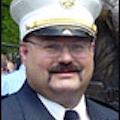As we are entering the budget preparation season we know that unfortunately, training is al to often viewed as a descretionary expenditure by many governments and organizations. Training dollars are usually the last budgeted and the first to be eliminated. It is a battle to get city, town, village and county managers to make the investment. They alway want experical data or proof it will work. This type of thinking has been going on for years upon years which stems from these individuals buying into the "The Big Lie": The return on funding invested in training cannot be precisely measured. This becomes one of the excuse they use couple with what would the citizens think of this spending.
Training goes to the heart of what makes an organization outstanding. Training develops organization members who are sharp, able and ready to solve problems they are faced with on emergency scenes. Training builds trust , cohesiveness, loyality and confidence not to mention competence with the team. This equips our personnel with the skills and the knowledge to serve and protect our community while providing service to the citizens who are our bosses (they pay taxes, taxes are our funding for everything). With this we also provide these individuals with the competive edge of critical thinking skills and abilities which help improve safety, service and reduce costs. Good training does all this and more however, it still can't be measured, or at least the ways the bean counters want.
As we see training funding cut for the fire service we can begin to relate this other outcomes. Injuries, lack of knowledge, failure to maintain the competative edge while the real world passes us by creating more hazards and challenges we are expected to be able to deal with and mitigate...without the proper knowledge. in 2009 we saw a decrease in the number of Line of Duty Deaths. This is great but will the trend continue or will the loss of dollars for training reverse this trend? Time will tell.
I agree that we have to be good stewarts of the funding we recieve and get the maximum benefit from each penny practicing the Sixth Sigma concept of recieving maximum returns on each investiment. However, you have to have something to invest to get any return. To the bean counters, you have to give us training money. To the fire service leaders and trainers, make sure we are getting maximum returns on our investiments.
Fire officers will need to develop a proactive rather than a reactive approach towards training. The mission of the fire department is developed by the Fire Chief. The efficiency of this direction is controlled at the company level. If you as a fire officer foster the proactive approach it will be contagious among the whole company and even the department. This will set the appropriate attitude of the group. Along with being proactive it is necessary for leaders to be innovative verses traditional in today’s world of budget cuts. Fire officers must find new ways to provide premier training under limited budgets and time constraints. This leads us to being resourceful. Fire officers will need to utilize all of the resources at hand to ensure that the training program is progressive. Finally, fire officers must be supportive of the training program and not detrimental. This support will carry along way and will guarantee that the attitudes are progressive and proactive.
About the Author

Doug Cline
Douglas Cline, is a 28-year veteran and student of the Fire Service serving as Training Commander with the High Point (NC) Fire Department. Cline also serves in the position of Administrative Assistant Chief with the Ruffin Volunteer Fire Department.
Cline, a former Fire Chief, is a North Carolina Level II Fire Instructor, National Fire Academy Instructor and an EMT-Paramedic instructor/coordinator for the North Carolina Office of Emergency Medical Services. Cline is a member of the North Carolina Society of Fire Service Instructors and the International Society of Fire Service Instructors where he serves on the Board of Directors as the First Vice President. Cline also has on the FEMA grant criteria development committee, peer reviewer for the Fire Act Grants, the Northern Director for the Piedmont North Carolina Fireman’s Association, Piedmont Director for the North Carolina Fallen Firefighters Foundation and Southeastern Association of Fire Chief’s Conference planning committee. Chief Cline also serves as Second Vice President of the Southeastern Division of the International Association of Fire Chiefs.
Cline was honored as the International Society of Fire Service Instructors (ISFSI), 1999 George D. Post International Instructor of the Year. Cline is also a member of National Association of EMS Educators (NAEMSE). He holds a Bachelors Degree in Social Services with a Minor in Education from Concord University.
Cline is a well known international speaker presenting dynamic power packed programs on instructor development, officer development, rapid intervention team training and firefighter safety and survival. Cline also is a highly published author with the most recent publications being with Thomson-Delmar Learning. The Publications are the Company Officer Test Preparation Guide Book with a scenario training DVD. Chief Cline is the technical content advisor for the Rapid Intervention Team Book published by Thomson-Delmar Learning and contributing author to the instructor support materials for the Rapid Intervention Team Book published by Thomson-Delmar Learning, test bank developer for the Fire Department Incident Safety Officer Book and contributing author to the instructor support materials for the Rapid Intervention Team Book published by Thomson-Delmar Learning. Chief Cline has also been a contributing author and reviewer to several of the IFSTA and Brady Emergency Medical Technician texts.
Cline hosts the monthly “Training and Tactics Talk” pod cast on Firehouse.com. Cline also has multiple training videos with the Fire Emergency Training Network (FETN) and American Heat to include, Rapid Intervention Team Training, Vehicle Fires, Hose line Management, Emergency Vehicle Operations and Fire Ground Safety and Survival. Cline is also a contributing editor to Firehouse.com and The Pennsylvania Fireman Magazine.
